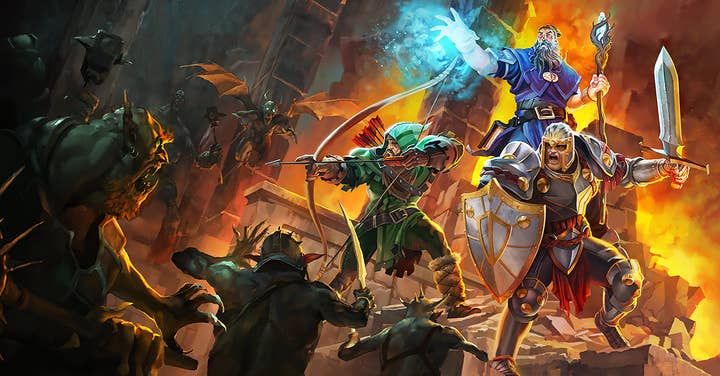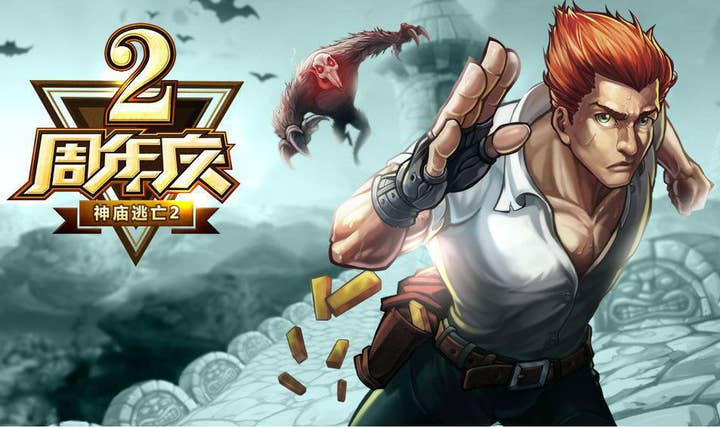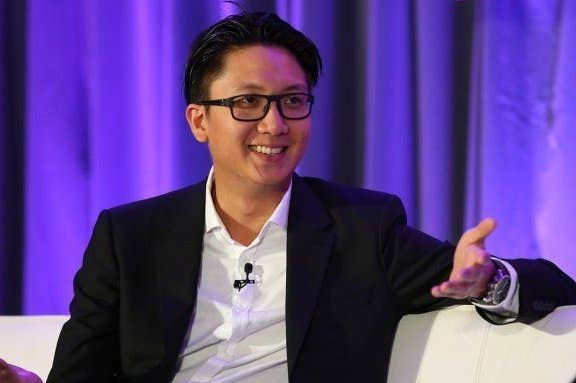"With the right launch 30 per cent of your revenue should come from China"
iDreamSky president Jeff Lyndon on rethinking 'global' success
Is China the biggest market for mobile games in the world? Your answer to that question will probably depend on which reports you read and which analysts you trust, but while opinions may vary on the timing, there is no room for debate on the conclusion. If China isn't already the global leader in mobile games, it will be very, very soon.
The end of America's time at the top of the heap is significant in myriad ways, not least because China's sheer size makes it difficult to conceive of how that primacy will ever be lost. For developers and publishers in Europe and North America - most of which are duking it out over the relatively slender wedge of revenue not funneled into the coffers of Supercell and King - this could be a watershed moment. According to iDreamSky president Jeff Lyndon, China's new position demands a fresh appraisal of what we mean when we talk about 'global' success.
"From this point onwards, if you want to say your game is a success globally you cannot really make that comment without having China in the picture," he says when we meet at DICE Europe, fresh from a talk in which Kabam's Aaron Loeb also implored European and North American developers to modify their thinking to keep pace with the changing market. "But then, if you look back, there aren't that many people who can say that they cracked the Chinese. Not Boom Beach, not Clash of Clans, not Candy Crush."
"There aren't that many people who can say that they cracked the Chinese. Not Boom Beach, not Clash of Clans, not Candy Crush"
If you're already aware of iDreamSky it's likely due to its successful IPO last year, at which point the company was worth $115 million - its market cap is now more than $500 million. In the main, Lyndon and his co-founders built that success on publishing mobile games in China, specifically those made by developers outside of the country. Back in 2009, Lyndon explains, finding "anything of quality" to release demanded that they reach beyond China's borders: Fruit Ninja, Temple Run, all the way up to this year's Inside Out, iDreamSky has been involved with some of the biggest foreign-made mobile hits published in the country.
Until recently, the company's focus was the casual market, but Lyndon recognised the need to diversify. iDreamSky made its first moves in the core mobile market back in 2012 - an attempt to find new ways to monetise its huge userbase - but it released too many games, resulting in too few hits. "In 2013 and 2014 we started to reorganise a little bit to re-address the issue," he says. "How to use what we had learned from casual game publishing? And how to leverage our userbase of 100 million MAUs and over 20 million DAUs, in core gaming? A lot of companies have tried that. Zynga, King, iDreamSky, we all started as casual game publishers."
There is a lesson here that may prove relevant to Activision's acquisition of King, which many regard as a bold, extremely expensive way of acquiring tens of millions of mobile users. That the Candy Crush games have enough players is - for now, at least - beyond argument, but iDreamSky had to learn some hard lessons about assuming that one kind of player will transition to a new kind of game experience. A Fruit Ninja player won't easily be tempted into, say, Dragon Age: Hero or Iron Force, and the results of that assumption prompted a retreat and a strategic rethink within the company. Following the experimental release of several Chinese core games last year, however, Lyndon has a renewed confidence in iDreamSky's ability to turn casual into core.

"We're trying to bring harder core Western games to China," he says. "Now we have cracked converting our Chinese casual userbase to Chinese core games, we definitely see that potential." That much is evident from the company's acquisition of 50.1 per cent of Rumble Entertainment in August this year, a $10 million deal motivated by both the studio's first project, a core RTS called King's Road, and the talent within its team. First-party development of both games and technology are a key aspect of the company's strategy going forward, Lyndon says, and in return Rumble Entertainment gets what so many European and North American developers now desire: a route into the world's most lucrative mobile market, one that gets bigger every single month.
And any company with serious designs on the Chinese market needs a partner like iDreamSky, says Lyndon. Of course, as CEO of the company one might expect him to preach the vitality of its services, but in this case it's entirely accurate. The self-publishing culture associated with mobile studios in Europe, North America and other key development hubs simply doesn't apply to the Chinese market, and Lyndon believes that many developers are underestimating the value of their own confidence - on iOS at the very least.
"If you want a good Chinese publisher to look at your game, don't tick the iOS box. That could hurt me down the road"
"It's way too complicated," he says. "And it's so easy when you launch your game in iOS to tick all the regions. China iOS and US iOS are the same, right? Just one tick away. But if you look at Disney's strategy, they didn't launch Inside Out in China. They launched it with a publisher, even on iOS. That is a mistake that a lot of people are making. They're like, 'On iOS I can do it myself. Android? Yeah, I'll find a publisher.' Then, six months later [when they launch the Android version], a Chinese publisher wants the iOS rights.
"You can't look at the market and see the iOS user and Android user are different. When I'm throwing marketing on it it's not just pure user acquisition. It's also brand marketing, and we need to look at the iOS side."
Much has been made of Apple's progress selling iPads and iPhones in China, but Lyndon believes that maximising revenue on the less fragmented iOS platform still requires local assistance. There are examples, he says, of Western games launching with a Chinese publisher and generating 40 per cent or more of their revenue from the iOS version. With developers who choose to handle the iOS version independently, however, that proportion can drop as low as 5 per cent. Indeed, communicating a harmonious message across both Android and iOS versions is so important to iDreamSky that, when Imangi Studios approached Lyndon about helping to launch Temple Run for Android, he chose to take down the already launched iOS version. According to Lyndon, it was the only approach that made sense.
"We took down Temple Run, and that's a painful process," he says. "If you're changing the old version for a new one, potentially you're losing all of those users. Launching yourself on iOS first, and thinking you can make some revenue, and if that iOS launch is successful it will give you more room when you talk to a publisher? No, it won't.
"For any developer outside of China looking at the Chinese market, you really need to think hard. It's not just one tick away. Ask yourself if you really have the capacity to do this in China. If you want a good publisher to look at your game, don't tick the iOS box. That could hurt me down the road."

In fact, Lyndon's ideal partner wouldn't present the same situation it had to tackle with Temple Run. Rather, iDreamSky would prefer to work with games that haven't launched in China in any shape or form, affording the opportunity to customise both a strategy and the content before the players' first encounter. Nevertheless, this remains a rarity, and that is becoming more and more difficult to justify as the Chinese market continues to grow. In simple terms, given the number of people in the region compared to almost every other country in the world, Western studios with global ambitions must now consider the Chinese launch as early as possible in a game's development. There is simply too much at stake.
"It's not going to be incremental revenue. It's going to be a big chunk of revenue. This shit looks like that," Lyndon says, stretching his arms out wide, almost as wide as the grin spreading across his face. "It should resemble what the whole mobile sector looks like. If China's market cap is, in total, 30 per cent of the whole mobile sector, then if you have the right Chinese launch 30 per cent your revenue should come from China.
"If your top-line revenue in China is only 10 per cent you're not maximising your potential"
"But if your top-line revenue in China is only 10 per cent that means you're not maximising your potential. And if we look at a lot of the games coming into China, most of them are around 10 per cent."
And Lyndon is now thinking beyond China for iDreamSky's future. The company has now successfully published games made by both local and foreign companies, variously targeted at casual, mid-core and hardcore players. In doing so, it has built knowledge about the best and worst practices in every sector, and a sense of a what a game with genuine worldwide appeal should look like is starting to form. According to Lyndon, that game would find a perfect balance between Western developers' care with content and gameplay, and the intricately constructed metagame common in Asian titles.
"Bringing a western game, fundamentally a western game, and marrying that to Chinese monetisation and retention technique," he says. "That's what we'll be trying to explore in the next year or so. Where is that equilibrium of metagame and core game? How to marry the two? The person who cracks that code will have created a true global phenomenon."
A person like Jeff Lyndon, perhaps?
"I hope."
GamesIndustry.biz attended DICE Europe as a guest of the organiser. Our travel and accommodation costs were covered as part of that agreement.

